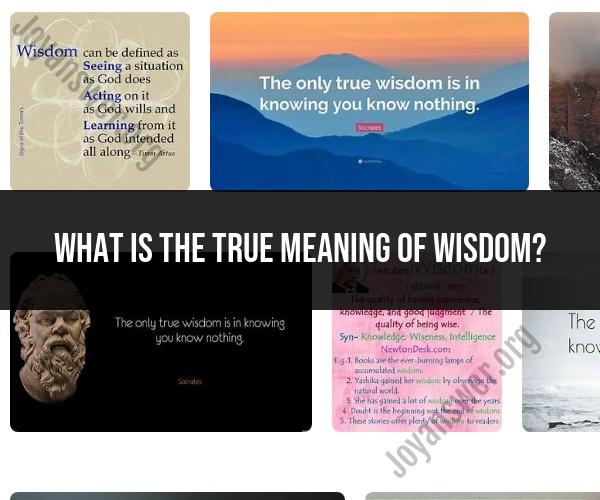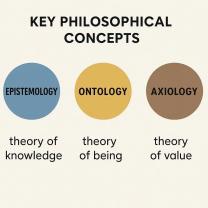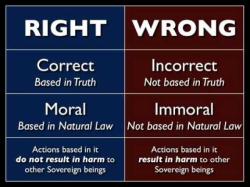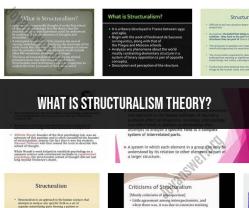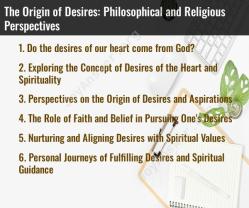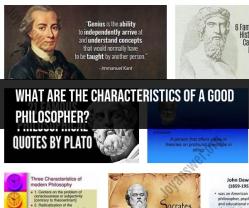What is the true meaning of wisdom?
The true meaning of wisdom is a multifaceted and deeply philosophical concept that encompasses a range of qualities and characteristics. It is often understood from various perspectives, including philosophical, psychological, ethical, and cultural viewpoints. Here are some dimensions that contribute to the true meaning of wisdom:
Knowledge and Experience: Wisdom involves a deep well of knowledge and life experiences. It is the result of learning from both success and failure, as well as from the experiences of others. Wisdom is not limited to academic or factual knowledge but also includes practical and emotional understanding.
Practical Application: Wisdom is not merely theoretical knowledge but the ability to apply knowledge effectively in real-life situations. It includes the capacity for good judgment, decision-making, and problem-solving. Wise individuals use their knowledge to make sound and ethical choices.
Ethical and Moral Values: Wisdom is closely connected to ethical and moral principles. Wise individuals tend to live in accordance with values such as honesty, integrity, empathy, compassion, and justice. Wisdom often guides individuals toward actions that benefit not only themselves but also others and the greater good.
Perspective and Insight: Wisdom provides a broader perspective on life. It enables individuals to see the bigger picture, consider long-term consequences, and navigate complexities with clarity and insight. Wise individuals understand the nuances of situations and can see beyond the surface.
Emotional Intelligence: Wisdom is associated with emotional intelligence, which includes the ability to understand, manage, and empathize with one's own emotions and the emotions of others. It leads to better interpersonal relationships and emotional well-being.
Humility: Wisdom often coexists with humility. Wise individuals recognize their limitations and are open to learning from others. They are not driven by ego or pride but by a desire for personal growth and understanding.
Resilience: Wisdom fosters resilience in the face of adversity. Wise individuals can cope with challenges, setbacks, and uncertainty with grace and fortitude. They bounce back from difficult situations and continue to grow.
Cultural and Spiritual Dimensions: Wisdom is shaped by cultural and spiritual perspectives. It can involve a deep connection to one's cultural heritage, traditions, and spiritual beliefs. Wisdom often provides answers to existential questions about the meaning and purpose of life.
Legacy and Impact: Wisdom often leads to a positive legacy. Wise individuals leave a lasting impact on their communities and society through their actions, contributions, and the values they uphold.
Continuous Learning: Wisdom is a lifelong journey. It involves a commitment to continuous learning, self-reflection, and personal growth. Wise individuals remain curious and open to new experiences and insights.
In essence, the true meaning of wisdom is a profound and multifaceted concept that combines knowledge, ethics, practicality, emotional intelligence, perspective, and a commitment to personal and societal well-being. It is a dynamic and evolving quality that is valued in many cultures and philosophies as a guiding principle for living a meaningful and virtuous life.
Unveiling the True Meaning of Wisdom
Wisdom is the ability to use knowledge and experience to make sound judgments and live a good and meaningful life. It is a complex and multifaceted concept, but at its core, wisdom is about using our knowledge and abilities to benefit ourselves and others.
Wisdom is not the same as knowledge or intelligence. Knowledge is the accumulation of facts and information, while intelligence is the ability to learn and understand new things. Wisdom, on the other hand, is the ability to apply our knowledge and intelligence in a wise and beneficial way.
Wisdom is also not the same as common sense. Common sense is the ability to make practical judgments based on our everyday experiences. Wisdom, on the other hand, is about seeing the big picture and understanding the consequences of our actions.
Wisdom Defined: A Comprehensive Understanding
Here are some of the key characteristics of wisdom:
- Understanding: Wisdom is about understanding ourselves, others, and the world around us. It is about seeing the world clearly and accurately, without bias or prejudice.
- Judgment: Wisdom is about making sound judgments. It is about weighing the pros and cons of different options and choosing the best course of action.
- Compassion: Wisdom is about being compassionate and understanding towards others. It is about seeing the world from their perspective and being kind and helpful.
- Humility: Wisdom is about being humble. It is about admitting when we are wrong and being open to new ideas.
- Courage: Wisdom is about having the courage to stand up for what is right, even when it is difficult.
The Heart of Wisdom: Delving into Its True Significance
The true significance of wisdom is that it helps us to live better lives. Wisdom helps us to make better decisions, overcome challenges, build strong relationships, and achieve our goals. It also helps us to live a more fulfilling and meaningful life.
In today's complex and ever-changing world, wisdom is more important than ever before. We face a myriad of challenges, from personal relationships to global problems. Wisdom can help us to navigate these challenges and to create a better future for ourselves and for generations to come.
How to Develop Wisdom
Wisdom is not something that we are born with. It is something that we develop over time through reflection, contemplation, and experience. Here are some tips on how to develop wisdom:
- Reflect on your experiences. Take some time each day to reflect on your experiences, both positive and negative. What went well? What could have gone better? What did you learn?
- Contemplate the big questions. Think about the big questions in life, such as the meaning of life, the nature of reality, and the relationship between good and evil.
- Learn from others. Seek out wise mentors and teachers who can share their insights with you.
- Be humble. Be open to new ideas and be willing to admit when you're wrong.
- Practice compassion. Try to see the world from other people's perspectives and be kind and understanding, even to those who disagree with you.
Developing wisdom takes time and effort, but it is a worthwhile investment. Wisdom is a gift that can help us to live better and more fulfilling lives.
